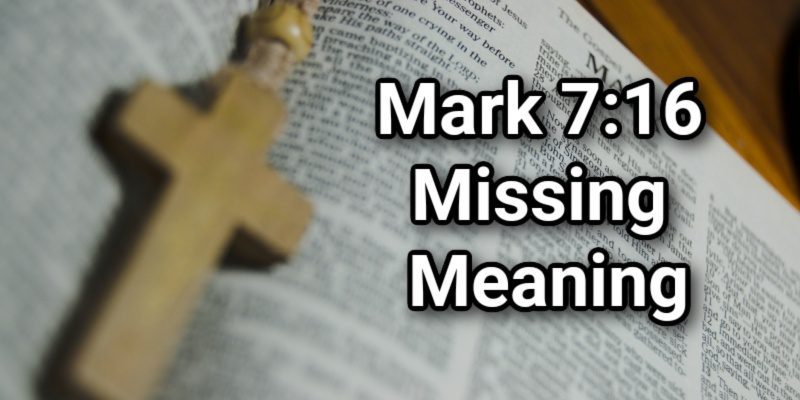Lord’s Library editors offer a Mark 7:16 meaning with commentary on why the verse is missing from new Bible versions, for your edification.
 When trying to understand the meaning of Mark 7:16 and see why it’s missing in modern versions, first see the verse: “If any man have ears to hear, let him hear.” This is a powerful statement from Jesus—one He repeats throughout the Gospels involving spiritual discernment.
When trying to understand the meaning of Mark 7:16 and see why it’s missing in modern versions, first see the verse: “If any man have ears to hear, let him hear.” This is a powerful statement from Jesus—one He repeats throughout the Gospels involving spiritual discernment.
This phrase is a dividing line: those who are willing to receive truth will lean in, listen, and obey; those who are hardened, proud, or deceived will ignore it. The verse can be seen as a spiritual filter and litmus test for the heart. This call to pay attention is completely missing from nearly all modern Bible versions, including the ESV, NIV, NASB, and CSB.
It is either bracketed or relegated to a footnote, claimed to be absent from “the earliest and best manuscripts.”
Mark 7:16 Missing Meaning
The verse follows Jesus’ teaching about what truly defiles a person, not righteous works of the law, but the condition of the heart. In Mark 7:14–15, He calls the people to hear and understand that defilement comes from within: “And when he had called all the people unto him, he said unto them, Hearken unto me every one of you, and understand: There is nothing from without a man, that entering into him can defile him: but the things which come out of him, those are they that defile the man.”
And then in verse 16, He punctuates that point: “If any man have ears to hear, let him hear.” The verse serves as an authoritative command. Jesus is warning His hearers that this truth is essential. It demands a response. By removing this verse, modern translators reduce the urgency of Christ’s command.
The reason given for its removal is familiar: Mark 7:16 does not appear in Codex Vaticanus and Codex Sinaiticus, the two fourth-century Alexandrian manuscripts that dominate the Nestle-Aland Greek text underlying nearly all modern versions.
But these manuscripts are notorious for their inconsistencies. Sinaiticus alone has thousands of corrections, while the Byzantine manuscript tradition—preserved in thousands of texts—includes the verse. So the question is not, “What did a few manuscripts say in the fourth century?” but “What did God preserve through the believing Church for generations?”
The King James translators, working with the Textus Receptus, rightly included this verse, as did nearly every Bible version prior to the 19th century. Only when Westcott and Hort introduced their critical Greek text, placing a higher value on a minority of manuscripts, did verses like Mark 7:16 begin to go missing.
And we should ask: Why this verse? Modern textual criticism has produced a Bible that is lighter on conviction, weaker on doctrine, and more appealing to modern readers. The cumulative result is a generation of Christians trained to skim Scripture rather than tremble at its details.
Mark 7:16 may be short, but its absence speaks volumes. It represents another quiet chisel stroke in the ongoing attempt to reshape the Bible into something safer and softer. But the Word of God is not safe. It is sharp, piercing, and commanding. See Hebrews 4:12: “For the word of God is quick, and powerful, and sharper than any twoedged sword, piercing even to the dividing asunder of soul and spirit, and of the joints and marrow, and is a discerner of the thoughts and intents of the heart.”
Matthew 11:15 is not filler—it is fire: “He that hath ears to hear, let him hear.” This is a call from the Lord of Lords to hear and obey! At best, a poor editorial decision was made to remove it from the Scriptures.
The King James Bible includes this verse because it follows the preserved line of the Word of God.
Lord's Library is a Christian resource hub. Our editors use a variety of internet research methods like search engines, audio and video, AI, consultations with ministry leaders in the field, and more. Lord's Library should never be a substitute for reading your Bible daily as the Scriptures are to be our final authority on all matters. Lord's Library participates in affiliate programs. We may make a small commission from products purchased through this resource.
- Mark 7:16 Meaning: Why is it Missing in Modern Bibles? - June 5, 2025
- What Does the Bible Say about Habits? With Key Scriptures - May 25, 2025
- What Does the Bible Say about Grief? With Key Scriptures - May 24, 2025















